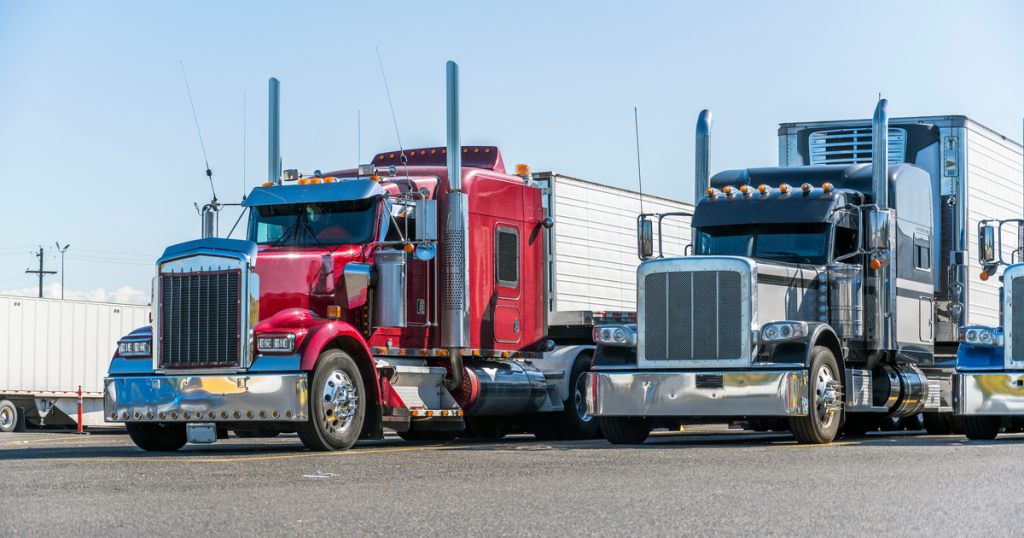
The trucking industry plays a critical role in keeping the U.S. economy moving. Responsible for transporting over 70% of all freight in the country, it connects manufacturers, suppliers, retailers, and consumers across vast distances. From everyday goods and groceries to industrial equipment and building materials, trucks deliver essential items that drive commerce and support communities.
In recent years, the industry has faced significant disruption—from the aftershocks of the COVID-19 pandemic to technological advancements and regulatory shifts. For fleet managers and business owners, keeping up with these changes isn’t just important—it’s essential for maintaining efficiency, compliance, and profitability.
Regulatory Changes and Compliance
Regulatory oversight continues to shape how fleets operate, and staying informed about these changes is crucial for maintaining compliance and avoiding costly penalties.
FMCSA Updates: ELD Mandates and Speed Limiters
The Federal Motor Carrier Safety Administration (FMCSA) has proposed several regulatory updates that will impact fleet operations. One key update involves revisions to the Electronic Logging Device (ELD) mandate. These changes aim to standardize device performance, improve data transfer efficiency, and address issues reported by drivers and carriers.
Another significant proposal under review is the nationwide speed limiter rule, which would require commercial vehicles over 26,000 pounds to use electronic engine control units to cap speeds—potentially around 68 mph. This measure is designed to enhance highway safety and reduce accidents, but it may also affect delivery schedules and fuel efficiency planning.
State-Level Adjustments: HVUT and Vehicle Registration
At the state level, changes in how Heavy Vehicle Use Tax (HVUT) compliance is verified are taking shape. Many states are tightening enforcement, requiring proof of IRS-stamped Schedule 1 before allowing registration or renewal of vehicle tags. Some states are integrating more advanced systems to electronically verify this documentation, making real-time compliance even more critical for fleet managers.
Additionally, certain states are adjusting their registration fees, emissions requirements, and inspection rules, creating more complexity for multi-state carriers.
Technology Integration
Technology is rapidly transforming the trucking industry, offering new ways for fleets to improve efficiency, safety, and cost control. From real-time data tracking to automated reporting, embracing these tools is becoming essential to staying competitive in a fast-evolving market.
Telematics and Fleet Management Software
Telematics systems have become a backbone of modern fleet operations. These systems use GPS tracking, vehicle diagnostics, and data analytics to provide detailed insights into driver behavior, fuel consumption, engine performance, and route efficiency. Fleet management software integrates this information, helping managers optimize routes, schedule maintenance proactively, reduce idle time, and cut operating costs.
Advanced platforms can also alert managers to compliance issues or mechanical problems before they become critical, minimizing downtime and enhancing fleet reliability.
AI, Automation, and Predictive Analytics
Artificial Intelligence (AI) is being used to automate routine tasks like route planning, load optimization, and driver scheduling. Predictive analytics, powered by AI, helps fleets anticipate maintenance needs based on usage patterns, identify at-risk vehicles before breakdowns occur, and even forecast fuel usage or traffic delays.
Automation also extends to back-office tasks—streamlining everything from tax calculations to invoicing and document management—freeing up human resources to focus on strategic decision-making.
Mobile Apps for On-the-Go Operations
Mobile apps are increasingly vital tools for both drivers and managers. They allow real-time communication, navigation updates, and document uploads from the field. Specialized apps like the ExpressTruckTax mobile app enable drivers and fleet admins to file Form 2290, receive IRS-stamped Schedule 1, and track HVUT compliance directly from their phones.
Additionally, mobile platforms support dispatch coordination, load tracking, and maintenance scheduling—bringing a level of agility and convenience that aligns with the fast-paced nature of the industry.
Driver Shortage and Workforce Dynamics
One of the most persistent challenges in the trucking industry today is the driver shortage. Despite growing demand for freight transportation, fleets across the country are struggling to find and retain qualified drivers.
Understanding the Driver Shortage
According to the American Trucking Associations (ATA), the industry faced a shortage of over 60,000 drivers in recent years, a number expected to exceed 160,000 by 2030 if current trends continue. This shortfall is driven by several factors:
- An aging workforce: Many drivers are nearing retirement age, with fewer younger workers entering the profession.
- Lifestyle demands: Long hours, time away from home, and physical strain make the job less appealing to new entrants.
- Regulatory hurdles: Drug testing requirements, stricter licensing, and insurance policies can prevent qualified candidates from entering the field.
- Pandemic aftereffects: COVID-19 led to training program delays and fewer new CDL holders, intensifying the labor gap.
Fleet Strategies to Attract and Retain Drivers
To combat these challenges, fleets are rethinking their workforce strategies:
- Competitive compensation: Many carriers have increased pay rates, introduced performance bonuses, and improved benefits to make the job more attractive.
- Flexible scheduling: More fleets are offering shorter hauls, predictable home time, and regional routes to appeal to drivers seeking work-life balance.
- Enhanced training and onboarding: Investment in training programs, mentorship, and career development opportunities helps newer drivers acclimate and feel supported from day one.
Recruitment and Retention Technologies
Technology plays a crucial role in modern driver management. Platforms that streamline the application process, automate background checks, and match candidates with optimal routes make hiring more efficient. Retention tools like mobile apps for HR support, feedback collection, and real-time communication enhance driver satisfaction and engagement.
Additionally, driver scorecards and performance dashboards are being used to provide constructive feedback, recognize top performers, and identify issues early—fostering a culture of accountability and support.
Fuel Costs and Inflation
Fuel remains one of the largest and most volatile expenses in the trucking industry. Combined with broader inflationary pressures, fluctuating fuel prices can significantly impact a fleet’s bottom line.
The Impact of Rising Fuel Prices
As diesel prices continue to vary due to global market conditions, geopolitical events, and supply chain disruptions, fleets are left to manage unpredictable cost structures. For long-haul carriers, even a minor increase in fuel costs per gallon can lead to tens of thousands of dollars in added annual expenses. When combined with inflationary spikes in equipment prices, insurance premiums, and labor costs, these challenges place pressure on fleet profitability and sustainability.
Fuel Optimization Tools and Hedging Strategies
To control costs, many fleets are leveraging fuel optimization software. These tools use real-time data and predictive analytics to identify the most fuel-efficient routes, monitor driver behavior, and reduce unnecessary idling or speeding. Some platforms also offer integrated fuel card solutions with discounts at partner fuel stations.
Larger fleets may also engage in fuel hedging—contracting fuel purchases at fixed prices to mitigate the impact of market swings. While complex, these strategies can provide cost stability and help with long-term financial planning.
Smart Routing and Load Planning
Operational efficiency plays a critical role in reducing fuel expenses. Fleets are increasingly turning to route optimization tools that factor in traffic patterns, elevation, weather, and road conditions to minimize fuel usage. Similarly, load planning software ensures that trucks are operating at full capacity, avoiding deadhead miles and unnecessary fuel consumption.
By combining smarter logistics with better data, fleets can respond more effectively to inflationary pressures, reduce waste, and maintain competitive service levels.
Data Security and Cyber Risks
As the trucking industry becomes increasingly digitized, data security is emerging as a critical concern. Fleet operations now rely on interconnected systems for dispatch, compliance, financial management, and real-time tracking—all of which can be vulnerable to cyber threats.
Rising Cyber Threats in the Transportation Sector
Cybercriminals are targeting the transportation and logistics sector at an alarming rate. High-profile ransomware attacks, data breaches, and phishing scams have disrupted operations at major logistics companies. These attacks not only compromise sensitive data—such as driver records, route information, and tax details—but can also halt fleet operations, leading to significant financial and reputational damage.
Fleet systems are particularly vulnerable due to:
- Multiple endpoints (mobile devices, onboard telematics, cloud platforms)
- Outdated software or unsecured networks
- Lack of cybersecurity training among personnel
Best Practices for Data Protection
To mitigate these risks, fleets must adopt comprehensive cybersecurity measures, including:
- Data encryption for all sensitive transactions and communications
- Multi-factor authentication (MFA) to secure access to fleet management systems
- Regular software updates and security patches to close vulnerabilities
- Employee training programs to recognize phishing attempts and practice safe online behaviors
- Routine data backups to protect against ransomware and system failures
Investing in a robust IT infrastructure and partnering with cybersecurity experts can also bolster protection across the board.
The trucking industry is at a pivotal moment, with evolving regulations, rapid technological advancements, rising operational costs, and workforce challenges reshaping how fleets operate. For fleet managers and business owners, staying ahead means embracing innovation, ensuring compliance, and adopting proactive strategies to attract drivers and control expenses.
Leveraging tools like ExpressTruckTax can simplify critical compliance tasks, such as managing HVUT filings and securing IRS-stamped Schedule 1s—essential for vehicle registration and avoiding costly penalties. Combined with technologies like telematics, mobile apps, AI-powered analytics, and cybersecurity solutions, fleets can navigate these industry shifts with greater confidence and efficiency.




